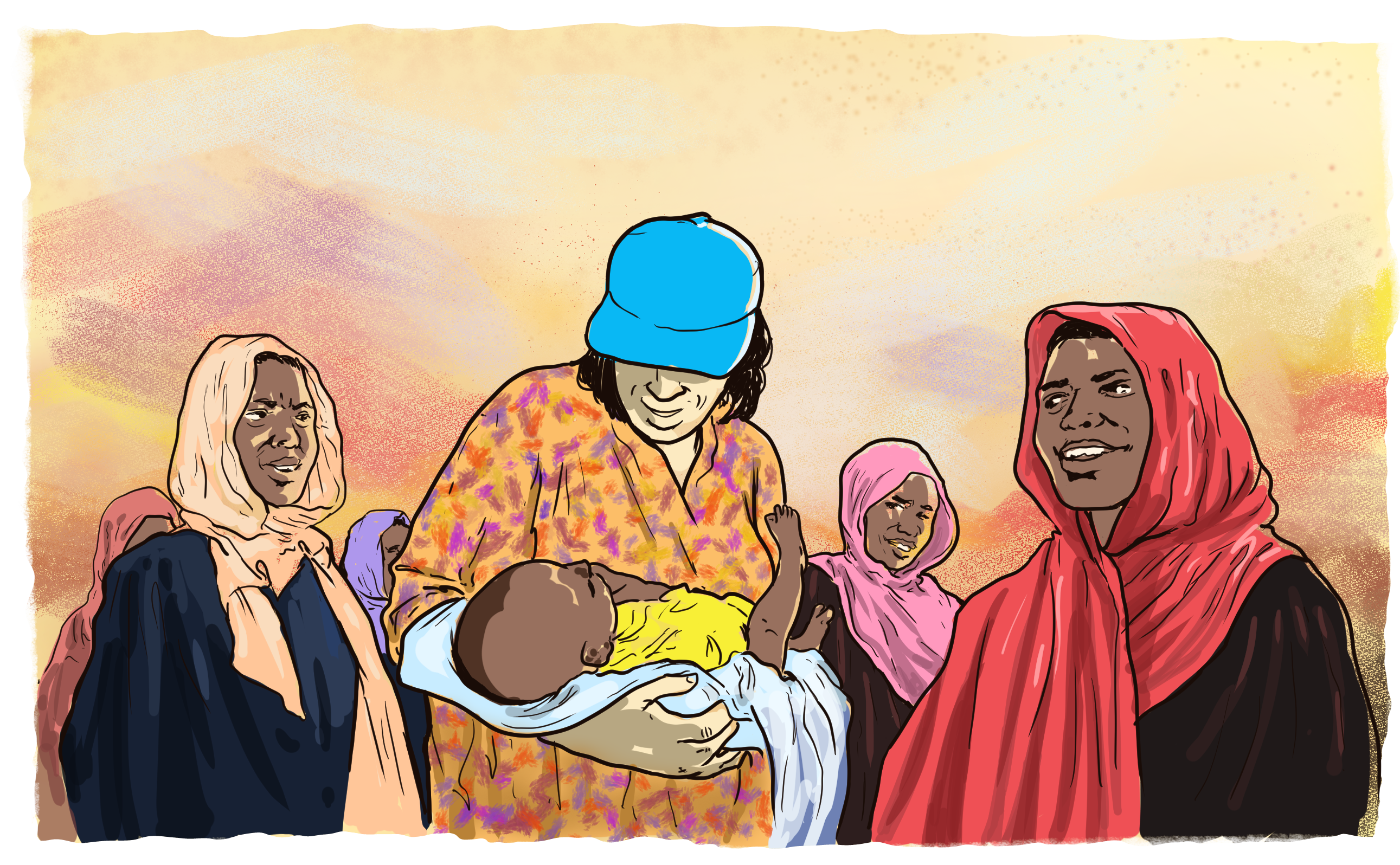In the words of Barkhado*: Women's organizations can contribute to peacebuilding by participating in negotiations and encouraging dialogue among the warring parties.
Date:

Barkhado is a Sudanese activist with a master's degree in peace and development. UN youth delegate 2023, a delegate at the global peace chain, and a co-founder of "Open Up for Peace and Development" and the "African Leadership Convention". She worked on the Project for Supporting Democratic Transition in Sudan (Women's Political Participation), and as a coordinator for the Transitional Justice Project with "Open Up". She was also responsible for the International Relations Office at the Institute of Judicial and Legal Sciences and is interested in youth political participation, human rights, and peacebuilding.
The ongoing conflict situation in Sudan, especially in Khartoum and West Darfur (El Geneina), has resulted in widespread destruction of infrastructure and the collapse of social and political systems. This has led to the killing of civilians, the rape of women, and an exacerbation of the situation in affected areas. Women and girls have been subjected to various forms of violence, with lasting effects They lack access to basic services like water, and face challenges in accessing healthcare and economic support. Violations against women have been committed by people wearing military uniforms. There have been alarming reports of sexual assaults against women. Unfortunately, due to challenging circumstances, comprehensive medical support cannot be fully provided to the affected women. According to reports from the Anti-Violence Protection Unit, 11 cases of violence against women have been registered in various areas of Khartoum.
Women’s immediate needs
Women and girls must be protected from gender-based violence, sexual assault, and rape. Women and girls need access to healthcare services, including medical care for survivors of rape, as well as access to sanitary pads and contraceptives. Support services should be provided for women and girls who have experienced violence, particularly gender-based violence, trauma, and displacement. Assistance should also be provided to women and girls to move from Khartoum to safer cities, especially those with special needs, children, and the elderly. Women and girls should have opportunities for education to help empower them and allow them to fulfill their potential. Women and girls also need access to employment opportunities and economic resources.
The role of women’s organizations
Women's organizations play a vital role in providing shelter, food, water, healthcare, and psychological support, and in monitoring violations and raising awareness to stop the war. They can contribute to peacebuilding by participating in negotiations and encouraging dialogue among the warring parties, promoting peaceful solutions to conflicts in Sudan.
"Peace for Sudan" platform
The “Peace for Sudan” platform was formed, focusing on women's initiatives in various states to address the current situation. The network's priorities include promoting dialogue between warring parties, encouraging peaceful solutions, and providing essential support such as shelter, food, water, sanitation, healthcare and education for women and girls affected by the war. The network also empowers women to raise their voices and work with their communities to halt the war and stop violations against women. In addition, the network aims to enhance collaboration among different women's organizations and knowledge sharing.
The priorities include:
- Identifying women's priorities and working towards their achievement, communicating them to international organizations and human rights bodies.
- Providing support and care for women and girls, including shelter, food, water, sanitation, healthcare, and psychosocial support for those affected by the war.
- Engaging women in peace processes, decision-making, and enhancing their role in conflict resolution and peacebuilding.
- Contributing to peacebuilding efforts by promoting dialogue, understanding, and cooperation among all warring parties.
- Ensuring the protection of women and girls from violence, particularly gender-based violence.
- Promoting peace and development.
- Pressuring for a cessation of war and enhancing women's roles by encouraging support from the local community.
- Supporting economically displaced women and providing employment opportunities.
The community can support these priorities through various means, including by encouraging local organizations and facilitating collaboration and coordination. Additionally, the community can provide support to women and girls affected by the war, and support efforts to find a peaceful solution to the conflict.
Additionally, in negotiations, it is important to establish a network that ensures the participation of women in decision-making processes and guarantees their representation. Partners should also establish a hotline for reporting gender-based violence anonymously. Women’s rights organizations should form a secretariat group to document violations, gather and preserve information, and work towards providing psychosocial support to address trauma and the psychological impact of war.
Partners should create employment opportunities for survivors, and support women and families to alleviate economic hardships or access necessary medical care. Women’s rights organizations can put pressure on governments to facilitate the procedures for seeking justice and providing refuge for women fleeing from war. We can also advocate for the payment of salaries to women by engaging with the various stakeholders.
The views expressed in this article are those of the author and may not necessarily reflect those of UN Women.
*Name changed to protect her privacy